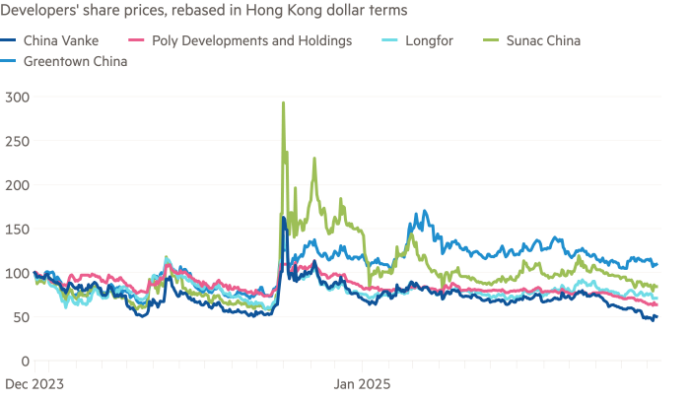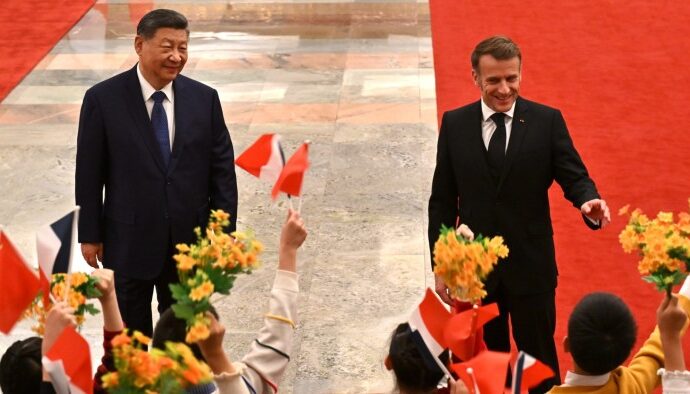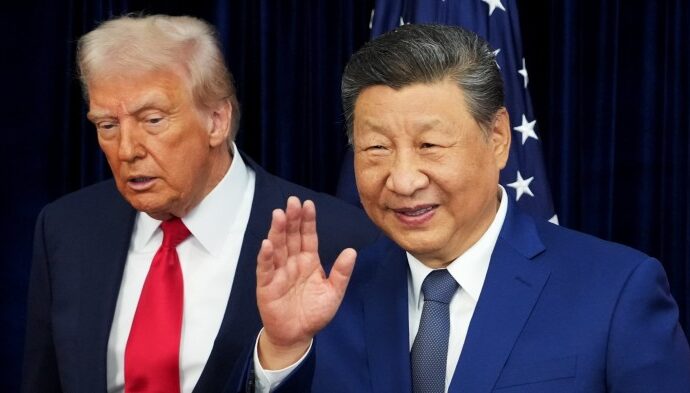This article is an on-site version of our FirstFT newsletter. Subscribers can sign up to our Asia, Europe/Africa or Americas edition to get the newsletter delivered every weekday morning. Explore all of our newsletters here
Good morning and welcome to FirstFT Asia. In today’s newsletter:
Apple’s AI rollout in China held up by Beijing
South Korea’s new president takes charge
Shareholders lambast $33bn take-private of Toyota subsidiary
Apple’s rollout of artificial intelligence services in China with Alibaba is being held up by a Beijing regulator, as the tech partnership becomes the latest casualty of Donald Trump’s trade war. Here’s what you need to know.
What’s happening: The tech giants have been working together to launch Apple Intelligence, the iPhone-maker’s suite of AI services, for Chinese users. Multiple AI products co-developed by the tech companies have been submitted to China’s internet authority this year for approval. But their applications were stalled at the Cyberspace Administration of China, two people familiar with the matter said, citing increasing geopolitical uncertainties between China and the US.
Apple’s trade war woes: Despite Apple partnering with Alibaba in a n attempt to win CAC approval, the high-profile relationship has still attracted regulatory scrutiny as US-China trade tensions have escalated. Apple has suffered in particular from the growing tensions between Washington and Beijing, with Trump pressuring the company to bring production back to the US. Delays to the release of Apple Intelligence in China are also hampering the US company as it faces increasing competition from Chinese rivals led by Huawei, Xiaomi, Oppo and Vivo. Read the full story.
Here’s what else we’re keeping tabs on:
Economic data: China May services PMI; Taiwan and the Philippines report May CPI inflation data.
Nintendo: The new Switch 2 games console goes on sale in the US, with the Japanese video game company forecasting sales of 15mn units in its current fiscal year.
Five more top stories
1. South Korea’s new leftwing president said his country faced a “tangled web of overlapping crises” as he was sworn into office after an emphatic election win. Lee Jae-myung vowed to overhaul what he said was an outdated and over-centralised model of development in Asia’s fourth-largest economy. Investors reacted very positively to his comments.
FT View: Lee’s victory is an affirmation of democracy after Yoon Suk Yeol’s martial law bid, writes the editorial board. But the new president faces serious difficulties at home and abroad.
2. Trump said Vladimir Putin was not ready for an “immediate peace” in Ukraine after an hour-long conversation yesterday during which the Russian president warned of retaliation for Kyiv’s drone attack on his country’s bomber fleet. “President Putin did say, and very strongly, that he will have to respond to the recent attack on the airfields,” the US president said on Truth Social after the call.
More on Russia: Moscow wants to deploy 10,000 troops in the separatist Transnistria region on Ukraine’s border and aims to install a pro-Kremlin government in Moldova to do so, the country’s prime minister has said.
3. Toyota Industries shares fell 12 per cent yesterday after minority shareholders lambasted a proposed $33bn privatisation for severely undervaluing the car parts supplier and trampling over their rights. Here’s why the deal has provoked investor outrage.
4. Singapore’s Temasek is drastically reducing its investments in early-stage companies, because of interest rate rises and following some embarrassing blow-ups for the state-owned fund. Temasek has become more bearish on high-risk unlisted companies, believing it is harder for them to go public, according to people with knowledge of the group’s investment strategy.
5. Columbia University no longer meets accreditation standards because of its violation of federal anti-discrimination laws, the US government said yesterday. The announcement marked another escalation in Trump’s battle against the US’s elite higher education institutions.
The Big Read
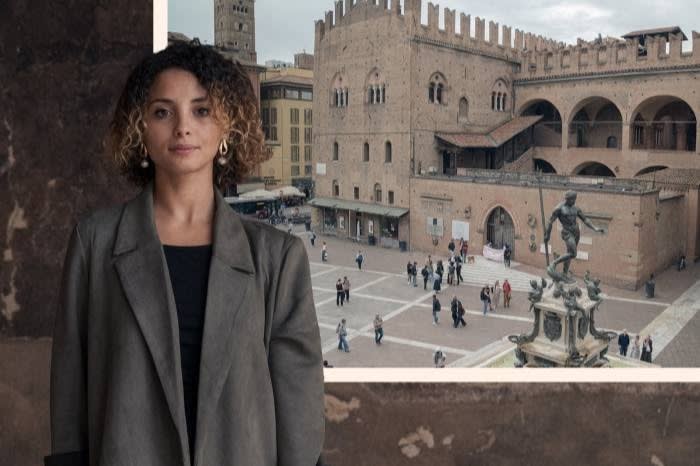
Italian voters are wrestling with the contentious issue of whether the country should ease its restrictive immigration rules and give its long-term, legal migrant workers — and their children — a faster path to citizenship. In a rapidly ageing society and with migrant flows dominating public discourse across Europe, there will be profound implications from a national referendum that asks: who gets to be Italian?
We’re also reading . . .
US psychedelic era: Magic mushrooms remain illegal in California but you wouldn’t know that from the gatherings in San Francisco, writes Elaine Moore.
Martin Wolf: Interest rates may have normalised in recent years, but the world does not look very “normal”.
Steel tariffs — again: The industry has suffered from overproduction and protectionism for decades, writes Alan Beattie.
Chart of the day
As gold enjoys a historic worldwide rally, the demand from Iran — which is the world’s fifth-largest consumer of gold bars and coins — has given the global market an extra boost. Here’s why Iranians are seeking safety in bullion.
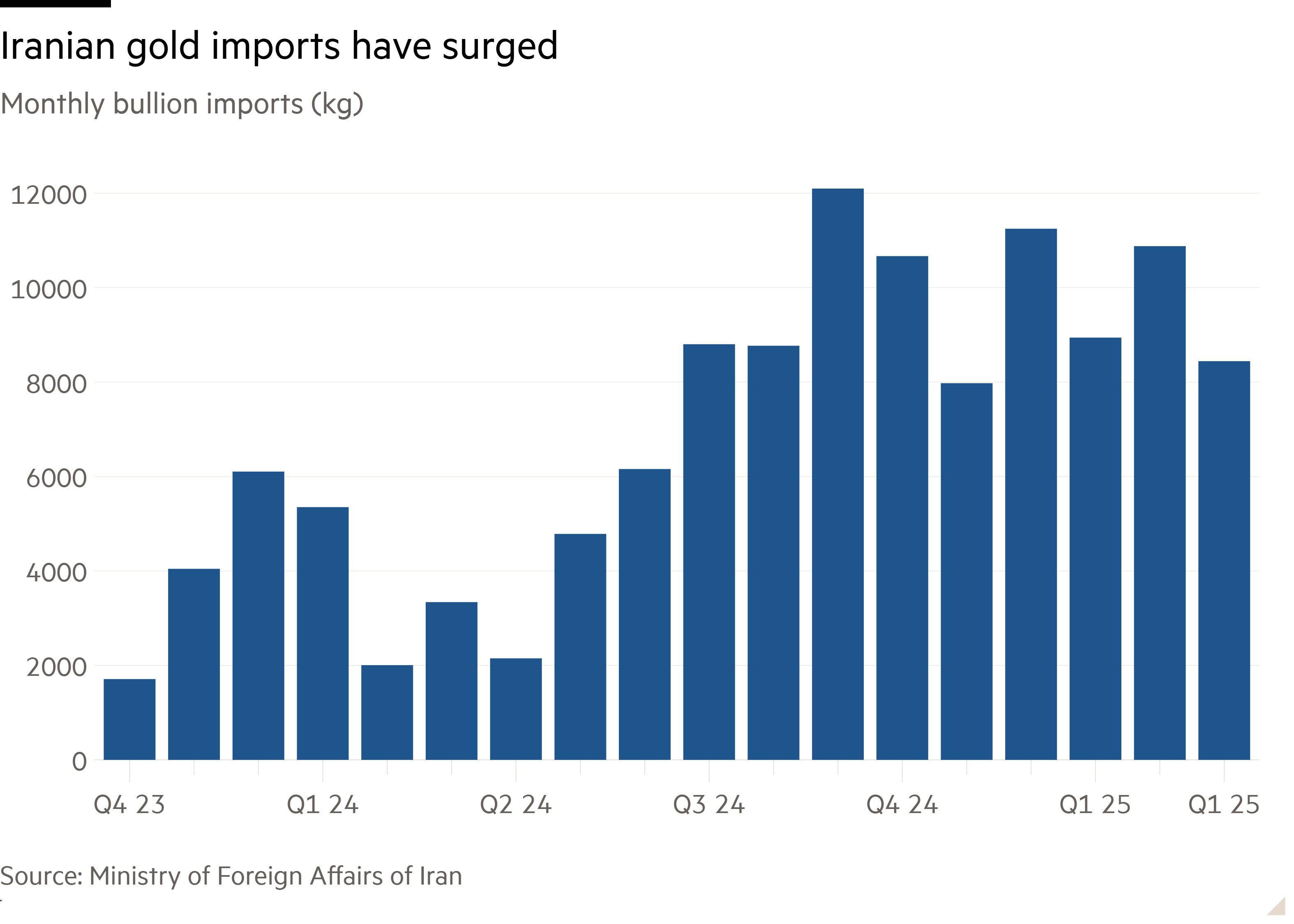
Take a break from the news
Researchers have developed a wireless, wearable “electronic tattoo” that estimates, in real time, how hard our brains are working, writes Anjana Ahuja. The transparent plaster is stuck on to the forehead and tracks brainwaves and eye movements. The development raises questions about who owns our neurodata?

